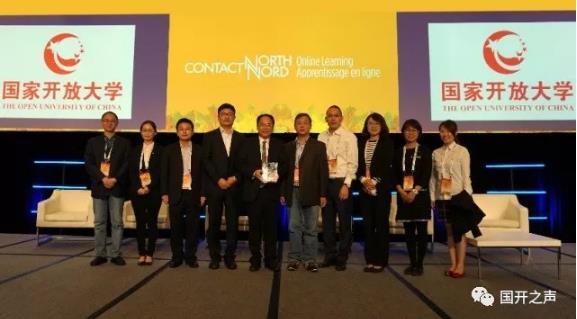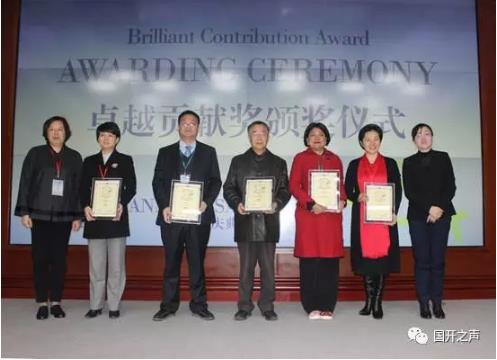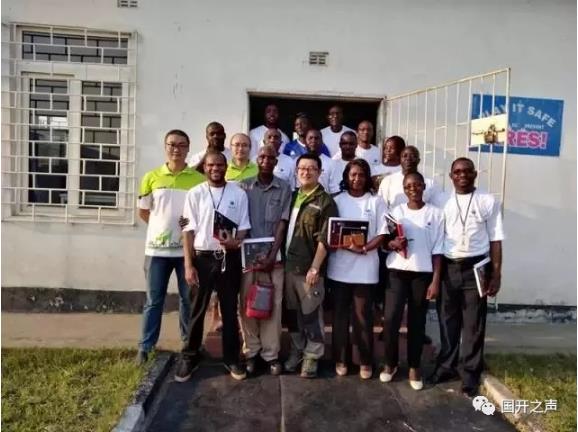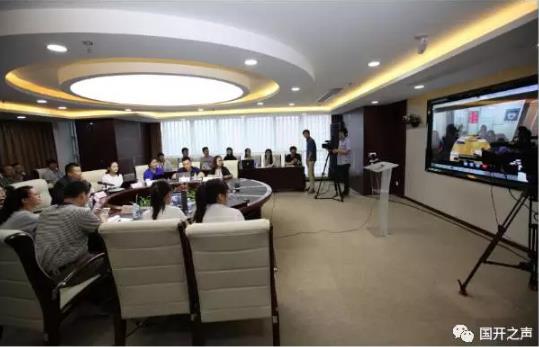 On 19th October 2017, at the closing ceremony of the 2017 ICDE, general secretary of the ICDE Gard Titlestad presented the ICDE Institutional Prize of Excellence award to OUC president Yang Zhijian.
On 19th October 2017, at the closing ceremony of the 2017 ICDE, general secretary of the ICDE Gard Titlestad presented the ICDE Institutional Prize of Excellence award to OUC president Yang Zhijian.
The OUC’s Contributions to Distance Education Win International Recognition
The ICDE Institutional Prize of Excellence is presented once every two years to institutions that have exhibited outstanding performance in the international open and distance education field in recent years. It is one of the important prizes in the modern open and distance education field.

The participants all said that the OUC deserves the prize for its excellent performance. Titlestad explained that the OUC was awarded the Institutional Prize of Excellence for its outstanding achievements in promoting educational equity, improving teaching quality, reforming and innovating its educational and learner development model, the in-depth integration of information technology into education, the construction of a credit bank for the accreditation, accumulation, and transfer of learning outcomes, and creating a uniquely Chinese path for development recognised and supported by both the Chinese government and the people.
This award honours the OUC’s efforts in promoting educational equity, lifelong education in China, and the development of education information technology. It is an important landmark in the enhancement of the strength and international presence of the OUC and evidence of the successful implementation of the OUC's international strategy.
Squeeze into the International Stage and Improve its International Voice
The 20th anniversary of UNESCO UNITWIN Network in Distance and Open Learning was celebrated in Shanghai on 20th November 2017. OUC vice president Yang Xiaotang attended the celebration and received the Brilliant Contribution Award. This award commends individuals who have made important contributions to the construction and development of the UNESCO UNITWIN Network in Distance and Open Learning and made outstanding achievements in exercising international influence.

In recent years, the OUC has positively participated in international activities and cooperation projects, for example, the formulation of internal rules for international organisations, and as a result it has constantly improved its voice in international organisations and enhanced its international presence. It has maintained a close relationship with UNESCO, ICDE, and AAOU. At present, the OUC is an executive committee unit of the AAOU and president Yang Zhijian is an ICDE committee member. Over the past five years, the research results of many tutors have won thesis prizes and nominations at ICDE and AAOU conferences.
Implement an International Strategy and Develop a Multilateral Cooperation Mode
The OUC’s first overseas study centre was founded in Zambia on 18th October 2017. The first batch of 137 computers, 200 desks and chairs, and equipment for three computer classrooms have been delivered to Zambia. 
Since the OUC was founded on the basis of CCRTVU in July 2012, "internationalisation" has become one of the five concepts of school operation. The OUC has actively responded to the Belt and Road Initiative and created a multi-dimensional, extensive, multi-level cooperation and communication model. According to related statistics, from 2009 to 2017, the OUC signed cooperation agreements with 17 domestic and international cooperation partners, covering scholar exchanges, cooperative training, cooperative research, the development of courses, sharing of teaching resources, and the expansion of teaching Chinese as a second foreign language. The signing of these cooperation agreements has laid a solid foundation for the OUC to carry out international cooperation and exchanges, clarified the cooperation direction, and improved the communication system and mechanism. During the 13th five-year planning period, the OUC plans to set up a series of OUC overseas study centres in Africa, Southeast Asia, and South Asia, contributing to the expansion of the openness of overseas education.
Introduction of International High-end Intelligence Pushes Academics to "Go Global"
At 4 pm Beijing Time on July 20th 2016 (9 am London Time), the OUC and the Open University (OU), UK held an online interactive exchange activity with the theme of "5 minutes and 60 seconds dialogue.” The two sides discussed the achievements and experiences of micro-course construction and application, and planned to carry out future cooperation in the fields of course learning resources construction, course introduction, and teaching research. The dialog aroused great attention from the media and China Daily and other media covered the issue.

In recent years, the OUC has strengthened international academic exchanges, and employed well-known experts and scholars in the international distance education field to hold seminars and lectures by organising academic activities. This has broadened the academic vision of the OUC's teaching and research and development staff, pushing them to "go global". In October 2012, the OUC employed the ex-chairman of the Common Wealth of Learning and ex-president of the OU John Denial as a senior consultant. In January 2013, Professor Haig from the University of Oslo visited the OUC.
At present, the World Open Universities Case Study Series research and development project launched by the OUC was listed as a "12th 'five-year' national key book publication planning programme" by the State Administration of Press, Publication, Radio, Film and Television. The books have won the recognition of well-known distance education experts and UNESCO experts from around the world, making great contributions to the research of the world open universities.
Organise Overseas Learning Exchanges and Promote Teaching Staff Construction
In October 2017, over 10 backbone tutors who undertake key construction projects visited the University of Toronto (UT) and Athabasca University (AU) in order to develop cooperation in scientific research and academic exchanges. They centred on the theme of "online course design and development in traditional universities" and "single model online course design and the development of open universities.” This has promoted teaching reform and online course construction at the OUC.

Between 2012 and 2016 there have been nearly 30 scholarly exchanges in the name of the Sino-British scholarship programme. They were sent to the OU, the University of Leicester, and the University of London to pay academic visits. The OUC has also made use of the AAOU scholar exchange programme to send visiting scholars to Universitas Terbuka (UT) and Korea National Open University to carry out research and development activities.
Their main tasks include attending international academic conferences, negotiating overseas academic cooperations, conducting multi-lateral academic discussions, researching cooperations, and scholar exchange activities. They have visited more than 20 countries and regions. By focusing on the OUC’s core tasks, the delegation met their targets and paid more attention to their achievements sharing. In recent years, the OUC strengthened the overseas dispatch of teaching research and development personnel. The overseas team gave more priority to the teaching and research and development personnel improved their innovation capabilities.
Over the past five years, the multidimensional implementation of the OUC’s international strategy has achieved fruitful results. The OUC has worked with well-known open universities, playing an important role and exercising great influence in the field of open and distance education. Looking forward to the future, during the 13th five-year planning period, the OUC will continue to leverage the advantages of its school system, actively respond to the Belt and Road Initiative, implement international exchanges and cooperation projects, strengthen cooperation with and assistance for agencies along the Belt and Road regions and African distance higher education institutions, explore a new model for Chinese education and Chinese culture dissemination, carry out international cooperation research, strengthen cooperation with the UNESCO, improve the influence of the OUC in international organisations such as UNESCO, ICDE, and AAOU, and enhance the overall position, presence, and authority of the OUC system in the international society.
By Chen Haishan and He Jing, OUC